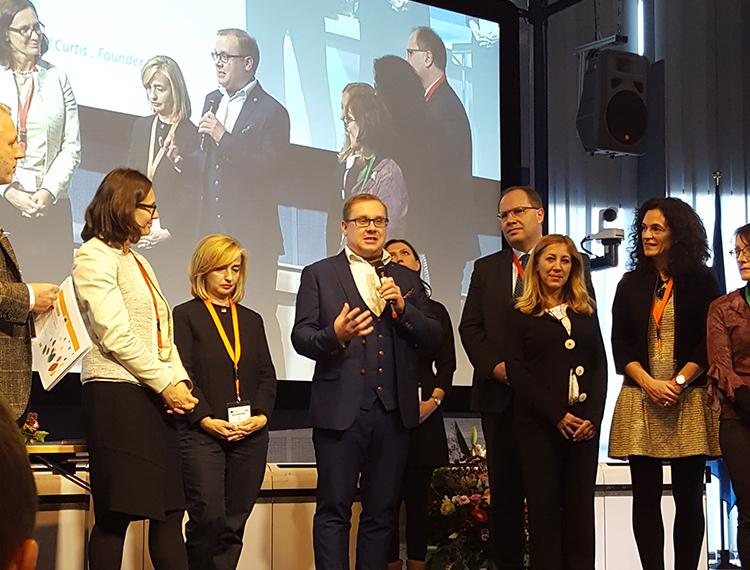Robotics – A new era in Vocational Training?

Last week saw the European Vocational Education Week take place. This pan-Europe event celebrates the work of the sector and discusses the reforms taking place.
The Mentoring School were invited to attend as new members of the European Alliance for Apprenticeships. We were invited to speak about our work on the National Apprentice Mentor Qualification within the sector. We attended the launch of the week, the Business-Education PACT for Youth conference and the closing event, including the 2017 European VET Awards (I am pleased to report a British apprentice won Apprentice of the Year).
The conferences were held in the European Commission headquarters in Brussels and featured a wide variety of speakers, including 2 robots – more on them later. Across the week, I was impressed with the collaborative nature of the VET providers attending, possibly bolstered by the announcement of a new level of Erasmus+ funding – ErasmusPRO – a fund to increase long term VET placements in other countries. For me a number of themes cropped up time and time again in presentations from both employers and also providers.
The biggest problem that all sides commented on was the huge divide in job skills verses employee skills. For example, there is a skills gap between those who are unemployed and the skills required for the unfilled vacancies. Likewise, jobs for life no longer exist and some are finding themselves.
Vocational Education Training (VET) is about life-long learning and we heard from speakers who shared their experiences of plugging these skills gaps in older learners. There is a huge pace of change that employers are already experiencing and they recognised the need for VET providers stepping up to help skill up the existing and future workforce to meet these needs.
Apprentices joined in the conversation through the European Apprentice Network – an organisation run by the EC, including several UK apprentices. They met for a day to set their priorities for good practice in apprenticeships across Europe. These include a high quality of education, contracts between apprentices, employers and providers, equality for apprentices, having information available and accessible for apprentices and finally the promotion of apprenticeships as equal to other forms of Further and Higher Education. This final point had been picked up by several speakers, including the Commissioners from the EC.
Important for our work, a number of large employers reported great interest in Reverse Mentoring schemes – training apprentices and young employees to mentor senior executives or managers to improve the performance of the business.
Mobility was discussed too, as an opportunity for sharing good practice, but also for developing employability skills. The European Commission (through the well-established Erasmus+ programme) are actively promoting the development of VET learners through placements in other countries. They feel that this not only promotes employability skills, but that it increases the enjoyability of VET learning.
The matter of technology use by VET providers was a topic of concern from the apprentices, employers and the providers. There was a recognition that traditional methods of delivery may become more removed from the requirements of further education training in the future. We were reminded that digital skills is not just about the technical skills, but also about the social and creative side. Digital apprenticeships were frequently mentioned and the Basque Government shared how they had created the role of Technology Educationalist to meet the needs of developing use of technology in teaching.
And finally time for the robots. Over the week we were joined by 2 humanoid robots. One demonstrated how they can be programmed to encourage people to do exercise – an excuse to get us all on our feet and doing silly actions. The second was involved in presenting the 2017 VET awards, by announcing the winners and congratulating them (and in one case upstaging them by careering off the front of the stage). Now in these cases robots have not replaced the human trainers, the first required programming and the latter required a human operator at the side. In talking to the company afterwards it became clear that currently this technology is an expensive replacement of technology, like tablets and scanners, that already exists, however it will not be long until this situation changes.
Visiting Brussels for the European Vocational Education Training Week was incredibly inspirational. It is easy to get caught up in the funding or educational reforms happening in the UK, but this was an opportunity to step away from that and focus on why we all do what we do – the learner. Funding, curriculum and assessment are all part of the method of our journey, this conference was far more about the wider issues in the sector.
Richard Daniel Curtis, CEO of The Mentoring School
Richard is an internationally renowned behaviour expert.











Responses